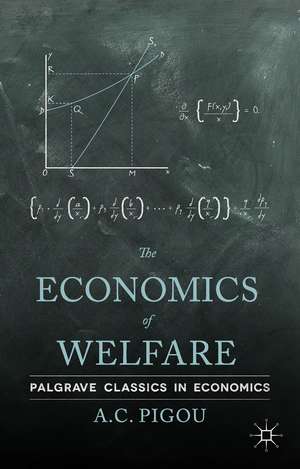The Economics of Welfare: Palgrave Classics in Economics
Autor A. Pigouen Limba Engleză Paperback – 6 dec 2013
Preț: 516.25 lei
Nou
Puncte Express: 774
Preț estimativ în valută:
98.82€ • 107.37$ • 83.06£
98.82€ • 107.37$ • 83.06£
Carte tipărită la comandă
Livrare economică 21 aprilie-05 mai
Preluare comenzi: 021 569.72.76
Specificații
ISBN-13: 9780230249318
ISBN-10: 0230249310
Pagini: 896
Ilustrații: XX, 876 p.
Dimensiuni: 140 x 216 x 47 mm
Greutate: 1.09 kg
Ediția:2013
Editura: Palgrave Macmillan UK
Colecția Palgrave Macmillan
Seria Palgrave Classics in Economics
Locul publicării:London, United Kingdom
ISBN-10: 0230249310
Pagini: 896
Ilustrații: XX, 876 p.
Dimensiuni: 140 x 216 x 47 mm
Greutate: 1.09 kg
Ediția:2013
Editura: Palgrave Macmillan UK
Colecția Palgrave Macmillan
Seria Palgrave Classics in Economics
Locul publicării:London, United Kingdom
Cuprins
PART I: WELFARE AND THE NATIONAL DIVIDEND 1. Welfare and Economic Welfare 2. Desires and Satisfactions 3. The National Dividend 4. What is Meant by Capital Intact 5. Changes in Size of the National Dividend 6. The Measurement of Changes in the Size of the National Dividend 7. Economic Welfare and Changes in the Size of the National Dividend 8. Economic Welfare and Changes in the Distribution of the National Dividend 9. Reactions Through the Numbers of the Population 10. The National Dividend and the Quality of the People 11. The Method of Discussion to be Followed PART II: THE SIZE OF THE NATIONAL DIVIDEND AND THE DISTRIBUTION OF RESOURCES AMONG DIFFERENT USES 12. Introductory 13. The Definition of Marginal Social and Private Net Products 14. The Values of Marginal Social Net Products and the Size of the National Dividend 15. Rates of Return and the Values of Marginal Private Net Products 16. The Effects of Eliminating Obstacles to Movement 17. Hindrances to Equality of Returns due toImperfect Knowledge 18. Hindrances to Equality of Returns due to Imperfect Divisibility of the Units in Terms of which Transactions are Conducted 19. Hindrances to Equality of Returns due to Relative Variations of Demand for Productive Resources in Different Occupations and Places 20. Divergence between Marginal Social Net Product and Marginal Private Net Product 21. Marginal Private and Social Net Products I Relation to Industrial Forms 22. Increasing and Decreasing Supply Price 23. State Regulation of Competitive Prices 24. State Regulation of Supplies 25. The Conditions of Monopolisation 26. Monopolistic Competition 27. Simple Monopoly 28. Discriminating Monopoly 29. The Special Problem of Railway Rates 30. Purchasers' Associations 31. Intervention by Public Authorities 32. Public Control of Monopoly 33. Public Operation of Industries PART III: THE NATIONAL DIVIDEND AND LABOUR 34. Industrial Peace 35. The Classification of Industrial Differences 36. Voluntary Arrangements for Conciliation and Arbitration 37. Mediation 38. Coercive Intervention 39. An Analytical View of Industrial Peace 40. Hours of Labour 41. The Methods of Industrial Remuneration 42. The Distribution of Labour Among Occupations and Places 43. Employment Exchanges 44. Unemployment versus Short Time 45. The Practicability of Interference to Raise Wages 46. Methods of Engaging Labour 47. Interference to Raise Wages in Places and Occupations where they are Unfair 48. Fair Wages Inside Particular Industries 49. Fairness as a Variable Relation 50. Interference to Raise Wages in Places and Occupations where they are already Fair 51. Wage Rates and Capacity 52. A National Minimum Time-Wage 53. Fixed and Fluctuating Wage Rates PART IV: THE DISTRIBUTION OF THE NATIONAL DIVIDEND 54. The General Problem of Disharmony 55. Pareto's Law 56. The Supply of Capital and Labour 57. Inventions and Improvements 58. The Manipulation of Wages 59. Rationing 60. Subsidies to Wages 61. Direct Transferences from the Relatively Rich to the Relatively Poor 62. The Effect on the National Dividend of the Expectation of Transferences from the Relatively Rich 63. The Effect on the National Dividend of the Expectation of Transferences to the Poor 64. Bounties on Things Purchased by the Poor 65. The Effect on the National Dividend of the Fact of Transferences from the Relatively Rich to the Poor 66. A National Minimum Standard of Real Income APPENDICES 1. Uncertainty-Bearing as a Factor of Production 2. The Measurement of Elasticities of Demand 3. A Mathematical and Diagrammatic Treatment of Certain Problems of Competition and Monopoly
Notă biografică
Arthur Cecil Pigou (1877–1959) succeeded his teacher Alfred Marshall in the Chair of Political Economy at the University of Cambridge in 1908. Over his long tenure in the professorship, ending in 1943, he institutionalized one of the most influential schools of thought in economics. Author of more than 30 books and 100 articles and pamphlets, The Economics of Welfare was his magnum opus.















